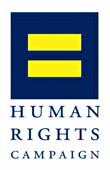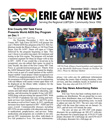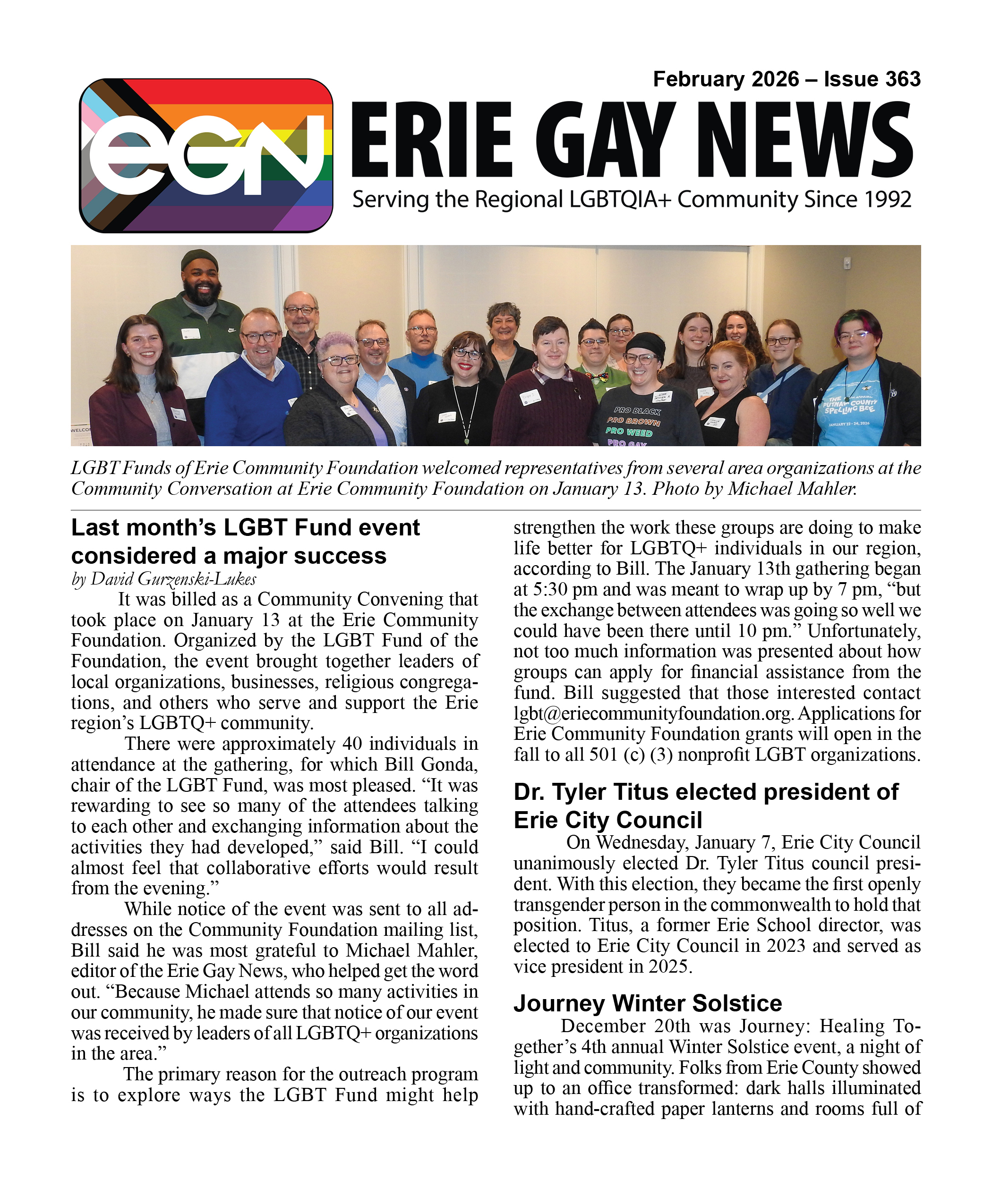The State of LGBTQ+ Equality in 10 Pennsylvania Municipalities Detailed in Human Rights Campaign Index - Erie Gets 100/100!
In eleventh edition of Municipal Equality Index, a record-setting number of 100 point scores and the highest-ever national average show that localities continue to lead the way on LGBTQ+ inclusion
Index Released As HRC Tracks More Than 345 Pieces of Anti-LGBTQ+ Legislation in States Across the Country
WASHINGTON - November 30, 2022- Today, the Human Rights Campaign (HRC) Foundation, the educational arm of the nation's largest lesbian, gay, bisexual, transgender and queer (LGBTQ+) civil rights organization, in partnership with The Equality Federation, released its 11th annual Municipal Equality Index (MEI), the only assessment of LGBTQ+ equality regarding municipal policies, laws and services in 506 cities across the nation, including 10 in Pennsylvania.
The average score for cities in Pennsylvania is 90 out of 100 points, which falls above the national average of 68. This year, a record-breaking 120 cities earned the highest score of 100, which is up from 11 in 2012, the MEI's inaugural year, illustrating the striking advancements municipalities have made over the past 11 years.
"LGBTQ+ people everywhere deserve to live in welcoming places that are focused on building equality for all. Since its launch 11 years ago, the main priority of the Municipal Equality Index remains supporting and celebrating the work cities do to serve LGBTQ+ people in the places they call home," said JoDee Winterhof, Human Rights Campaign Senior Vice President of Policy and Political Affairs. "This year, we've seen a disturbing number of extremist legislators attacking transgender and non-binary youth for no reason other than to erase them and their families. However, we're seeing local leaders continue to push forward in making equality and inclusion the cornerstone of their cities. By doing so, they have helped to create safe, welcoming spaces for all families while spurring economic growth by signaling to residents, visitors and employers that their city is open to everyone."
This year alone, HRC tracked more than 345 pieces of anti-LGBTQ+ legislation introduced in state houses across the nation, more than 145 of which specifically target transgender and gender non-conforming individuals. While some extremist state legislators seek to abolish fundamental human rights, city leaders and officials have stepped up to protect the rights of LGBTQ+ communities.
"At a time when anti-LGBTQ+ opponents are using the rights of transgender youth as a political wedge issue, it can be disheartening to be a queer or trans person in this country," said Fran Hutchins, Executive Director of Equality Federation Institute. "But despite the increasing attacks we are seeing on transgender youth in state legislatures, the important work to advance protections for LGBTQ+ people continues at the local level. Often the greatest opportunities for victories to improve the lives of LGBTQ+ people are in the states and cities-where the work is hard but the impact is great. I am encouraged by the work of state and local advocates who keep having the tough conversations, changing hearts and minds, and seeing progress in their communities as a result - we are all better for it."
In Pennsylvania, Allentown, Carlisle, Erie, Philadelphia, Pittsburgh, Reading and State College are setting a true example for equality and inclusion by earning one of HRC's MEI "All-Star" designations. MEI All-Stars earned over 85 points despite hailing from a state without statewide non-discrimination statutes that explicitly include sexual orientation and gender identity.
The report also contains issue briefs for policymakers that covers how cities can support transgender individuals with healthcare protections, as well as an issue brief that highlights the reality that abortion rights also affects the LGBTQ+ community and that city governments do have the power to implement LGBTQ+ inclusive abortion rights.
"The progress made on a local level for greater LGBTQ+ equality and inclusion for all has never been more important. The MEI continues to help guide, shape and inspire more LGBTQ+-inclusive laws and policies in cities of all sizes throughout the nation," said Cathryn Oakley, State Legislative Director & Senior Counsel for the Human Rights Campaign and Founding Author of the Municipal Equality Index. "This program is one of the key ways HRC is able to impact the daily lives of our members, supporters and allies. At a time when extremist state and federal lawmakers are using increased inflammatory rhetoric and enacting anti-LGBTQ+ agendas, it's inspiring to see municipalities continue to push themselves to better serve their LGBTQ+ communities. I am incredibly proud of this project and of the MEI team who have made this report a vehicle of enduring change and of our partners in communities around the country who have enthusiastically embraced its possibilities."
Other significant findings from the 2022 MEI include:
- The national city score average jumped to an all-time high of 68 points, up from 67 points last year, marking the fifth consecutive year of national average increases.
- This year, 187 cities have transgender-inclusive healthcare benefits for municipal employees-up from 181 in 2021.
- 41 municipalities have anti-conversion therapy ordinances in states with no state-level protections.
- Cities around the country saw progress, withalmost every region of the country seeing a higher average score than last year:
- Great Lakes - 83 (up from 82 last year)
- Mid-Atlantic - 82 (up from 80 last year)
- West - 77 (same as last year)
- New England - 69 (same as last year)
- Plains - 64 (up from 63 last year)
- Southeast - 55 (up from 52 last year)
- Mountain - 55 (up from 53 last year)
- Southwest - 54 (up from 51 last year)
The MEI rated 506 cities including the 50 state capitals, the 200 largest cities in the U.S., the five largest cities or municipalities in each state, the cities home to the state's two largest public universities, the 75 municipalities that have high proportions of same-sex couples and 98 cities selected by HRC and Equality Federation state group members and supporters. It assesses each city on 49 criteria covering citywide non-discrimination protections, policies for municipal employees, city services, law enforcement and the city's leadership on LGBTQ+ equality.
Even though local leaders continue to pave the way forward on equality, there remains an unacceptable patchwork of laws for LGBTQ+ people across the country. This reinforces the need for the federal Equality Act that would provide consistent and explicit non-discrimination protections for LGBTQ+ people across key areas of life, including employment, housing, credit, education, public spaces and services, federally funded programs, and jury service.
The Pennsylvania cities scored are as follows:
- Allentown: 94/100 (All-Star designation)
- Carlisle: 88/100 (All-Star designation)
- Erie: 100/100 (All-Star designation)
- Harrisburg: 71/100
- New Hope: 81/100
- Philadelphia: 100/100 (All-Star designation)
- Pittsburgh: 100/100 (All-Star designation)
- Reading: 91/100 (All-Star designation)
- State College: 100/100 (All-Star designation)
- Wilkes-Barre: 70/100
The full report, including detailed scorecards for every city, as well as a searchable database, is available online at https://www.reports.hrc.org/municipal-equality-index-2022.
The Human Rights Campaign Foundation is the educational arm of the Human Rights Campaign (HRC), America's largest civil rights organization working to achieve equality for lesbian, gay, bisexual, transgender and queer (LGBTQ+) people. Through its programs, the HRC Foundation seeks to make transformational change in the everyday lives of LGBTQ+ people, shedding light on inequity and deepening the public's understanding of LGBTQ+ issues, with a clear focus on advancing transgender and racial justice. Its work has transformed the landscape for more than 15 million workers, 11 million students, 1 million clients in the adoption and foster care system and so much more. The HRC Foundation provides direct consultation and technical assistance to institutions and communities, driving the advancement of inclusive policies and practices; it builds the capacity of future leaders and allies through fellowship and training programs; and, with the firm belief that we are stronger working together, it forges partnerships with advocates in the U.S. and around the globe to increase our impact and shape the future of our work.



